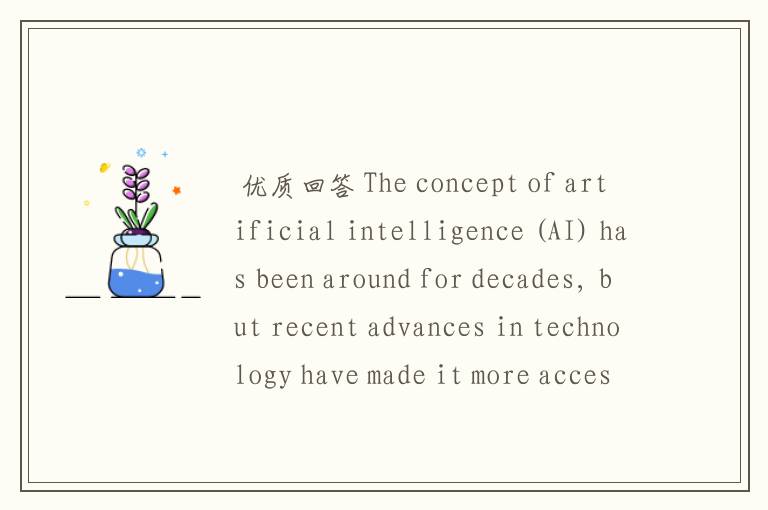- 1、
本文匹配到多条相关结果,欢迎阅读!
(一)

优质回答The concept of artificial intelligence (AI) has been around for decades, but recent advances in technology have made it more accessible and impactful than ever before. AI refers to the development of computer systems that can perform tasks that would typically require human intelligence, such as visual perception, speech recognition, decision-making, and problem-solving.There are several different types of AI, including narrow AI and general AI. Narrow AI, also known as weak AI, is designed to perform specific tasks within a limited domain. Examples of narrow AI systems include voice assistants like Siri and Alexa, recommendation algorithms used by streaming services like Netflix, and self-driving cars. These systems are highly specialized and can only perform the specific tasks they were designed for.On the other hand, general AI, also known as strong AI or artificial general intelligence (AGI), refers to AI systems that have the ability to understand, learn, and apply knowledge across a wide range of tasks. General AI would possess human-like intelligence and be able to perform any intellectual task that a human being can do. While general AI is still largely theoretical, researchers and scientists are working towards developing systems that can mimic human intelligence in a more comprehensive way.AI technology relies on a variety of techniques and algorithms, including machine learning, deep learning, natural language processing, and computer vision. Machine learning is a subset of AI that focuses on the development of algorithms that can learn from and make predictions or decisions based on data. Deep learning is a subset of machine learning that uses artificial neural networks to model and understand complex patterns in data. Natural language processing (NLP) enables computers to understand and interact with human language, while computer vision allows machines to perceive and interpret visual information.AI has the potential to revolutionize many industries and aspects of daily life. In healthcare, AI can help diagnose and treat diseases, assist in drug discovery, and improve patient outcomes. In finance, AI can be used for fraud detection, algorithmic trading, and personalized financial advice. In transportation, AI can power self-driving cars and optimize traffic flow. In education, AI can personalize learning experiences and provide individualized feedback to students. These are just a few examples of the many ways AI is being applied to improve efficiency, accuracy, and decision-making across various sectors.However, AI also raises ethical and societal concerns. There are concerns about job displacement, as AI systems have the potential to automate many tasks currently performed by humans. There are also concerns about bias and fairness in AI algorithms, as they can perpetuate existing social inequalities if not properly designed and monitored. Additionally, there are concerns about privacy and data security, as AI systems often rely on large amounts of data to learn and make predictions.Overall, AI is a rapidly evolving field with the potential to transform many aspects of our lives. It has the power to improve efficiency, accuracy, and decision-making, but it also presents challenges and risks that need to be carefully addressed. As AI continues to advance, it is important to ensure that it is developed and deployed in a way that benefits society as a whole.
今天的分享就到这里了,希望本文《莓茶的禁忌人群:》能为您带来新的思考和启示。敬请关注www.entea.com.cn,更多有趣内容等待您的发现。
转载请注明来自,本文标题:莓茶的禁忌人群:
本文地址:https://www.entea.com.cn/cwh/4780.html
